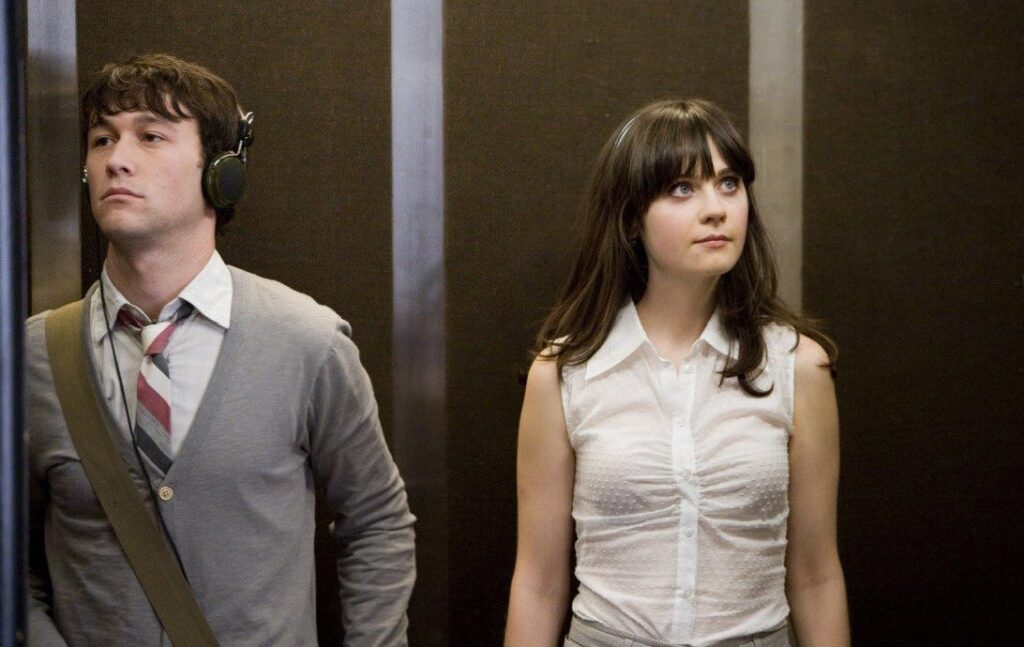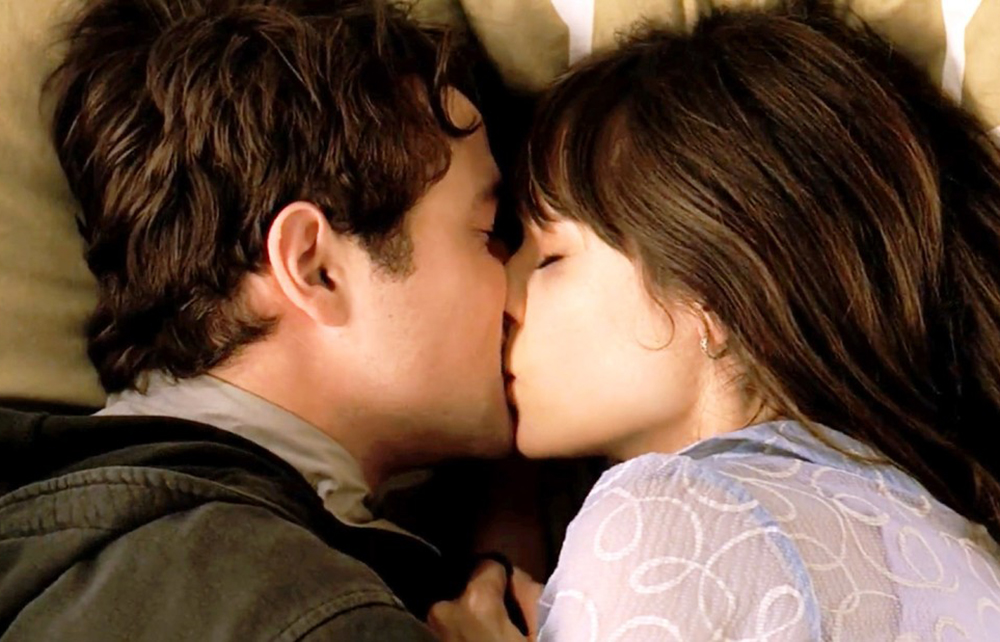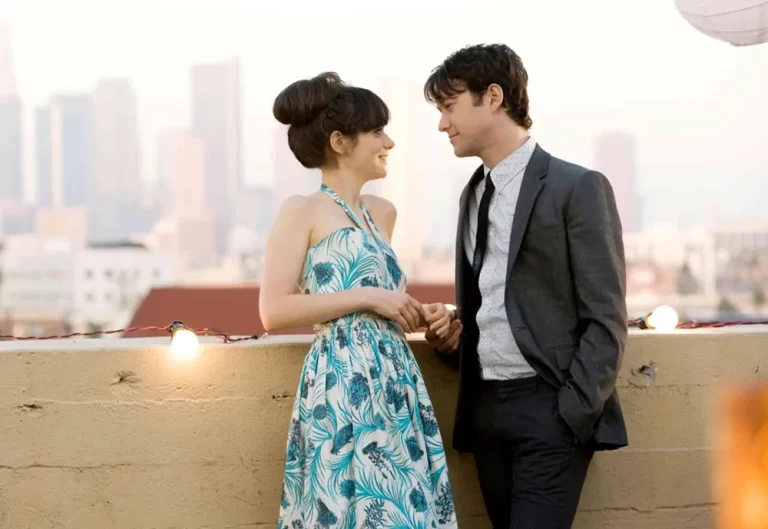I must admit I’m feeling kind of old revisiting “500 Days of Summer,” because when I last saw it, not only was I in a much different place in my life…I was also a lot younger. I’m 46. I was 31 when I first saw it upon its DVD release. It came out in theaters in the summer of 2009. To be more precise, it came out in a limited release on July 17, 2009 and then in a wide release on August 7, 2009. Not only was I different, but our country was different. We were, for the most part, still basking in the afterglow of Barack Obama’s win. Not only was our first black president one for the history books, it was a hopeful, optimistic time as well. It was a time when the nation could start fresh and begin again after eight long years of George W. Bush. The status quo of old white men running the country had shifted and anything seemed possible. The new boss wasn’t the same as the old boss…yet.
Our central character is Tom (Joseph Gordon-Levitt). He studied to be an architect, but it didn’t work out. A lot of college graduates, especially in their 20s, can relate to this. They get jobs out of college, earning enough to pay off their student loans and to start becoming self-sufficient. But these jobs often have nothing to do with what they majored in and are passionate about. Tom is in a rut. He’s a little frumpy and unkempt in his hair and clothing. He’s not really happy, stuck in his comfort zone of working for a company he writes greeting cards for.
The Film Succeeds at Capturing its Relationship
Tom’s friends, Paul (Matthew Gray Gubler) and McKenzie (Geoffrey Arend) and his sister, Rachel (Chloe Grace Moretz) become worried and uncomfortable when he says he’s in love with Summer (Zooey Deschanel). They’re used to him falling hard and getting hurt. Anyone who is a romantic at heart will be able to completely relate to this. Summer, on the other hand, especially since her parents’ divorce, doesn’t believe in true love and in finding your soulmate. It is clear that she’s very different from Tom and thus, is the wrong woman for him. She’s independent to a fault. She goes through one man after another in her relationships, not allowing herself to get too close to any of them. This prompts McKenzie to interject, “What are you, a lesbian?!” and to comment, “Holy $hit. You’re a dude!” I like that Joseph Gordon-Levitt plays it straight with McKenzie’s hilarious drunken antics. Because Tom has known him for ages, he’s bored with them instead of getting horrified by them. Tom is smitten with Summer and makes the mistake of telling her he’s fine with having a superficial relationship with her. But in reality, it goes against every single one of his natural tendencies.
The film is at its best when it goes through the ups and downs of Tom and Summer’s relationship and it captures it all with stunning accuracy. Not only does it make me cringe, but it also makes me glad that I never have to revisit the heartbreak I went through in my 20s. There’s something about that age range in which everything is so much more emotional and heightened. We make the worst decisions, such as pinning all of our hopes on that one person. Hall & Oates fans will be able to appreciate the “You Make My Dreams Come True” dance sequence in which everything seems perfect when you’re in love. Furthermore, I love the innocent, careful, and magical way that Tom interacts with the bluebird in this scene. It reminds me of the animation in the Golden Age of Disney movies.
Storytelling that’s New and Original
Other points when the movie is in top form are when they’re alluding to the classic films that came before. Temper Trap’s “Sweet Disposition” plays and Tom shows Summer his favorite spots around Los Angeles. There’s one spot in particular that he brings her attention to, saying that if he was the architect in charge of it, he would make people notice it more. She gives him a pen and encourages him to show her how he would do this. He proceeds to draw a perfected skyline, in which the buildings are better integrated, on one of her arms. It’s very reminiscent of “Hannah and Her Sisters” when the architect David (Sam Waterston) shows April (Carrie Fisher) and Holly (Dianne Wiest), who are both vying for his attention and affection, his most loved buildings in New York City. The characters speaking directly to the camera, such as Tom’s boss, Vance (Clark Gregg) and one of his close friends, Paul, about their spouses is very much in the vein of “Annie Hall” and “When Harry Met Sally.”

The storytelling is new and original, telling the days consistently out of order throughout the film. This technique reflects the messiness, spontaneity, and unpredictability of life and relationships. Writers will also appreciate this device; they know too well it’s impossible to tell a story in chronological order. Actor Richard McGonagle does a fantastic job as the narrator. He has the perfect deep, gravelly, and sexy voice indicative of voiceovers in movie trailers. Instead of telling us how we should feel, like most narration does, he elaborates on what the given scene is trying to communicate to us. Although he warns us this is not a love story, he is still optimistic that fate exists and so is the film in pointing out that we learn something important in each relationship that leads us closer to finding the right person. Basically, you’re supposed to be so happy, content, and fulfilled in the current long-term relationship you’re in, that you want to go back and personally thank each and every one of the people you were involved with for it not working out. Okay, so maybe not every single one, but you know what I mean.
Sometimes the Script Feels Rushed
Chloe Grace Moretz is brilliant and very cute as Tom’s younger sister, Rachel. She reminds me of Holden Caulfield’s precocious little sister, Phoebe, in the book “The Catcher in the Rye.” She’s very loyal, always giving Tom excellent advice and listening to him. This is especially true when he’s in the middle of his meltdown over losing Summer. One of her best scenes with him is when she rushes over on her bike late in the evening to his apartment, tells his friends that they did the right thing in contacting her, gives him a glass of vodka, and tells him to start from the beginning. Another great and moving scene is when she advises Tom not to romanticize his relationship with Summer. She urges him to assess it more realistically when he looks back on it again.
Something about the script feels thin and hollow, like they cut too many scenes out and then had to rebuild it and did so somewhat unsuccessfully. Just because the cast and crew may find certain scenes funny, it doesn’t mean that the audience will. This ushered in a very self-involved kind of approach to filmmaking, in which the insiders are a little too impressed with how clever and witty their jokes are and it’s at the expense of filmgoers. Whether you like it or not, you always have to write with the audience in mind and then for yourself.
Warm, Nostalgic Cinematography

Some of the unfunny and annoying throwaway scenes that come to mind are when he and Summer are gradually shouting the word penis louder and louder in the park, they watch porn together and try to recreate one of the scenes in the shower, and he’s a lousy date to a woman his friends set him up with shortly after his break-up with Summer. Something much more important could’ve been added in place of these scenes. One change could’ve been fleshing out the character of Summer better. I never really feel like I know her very well, and maybe that’s intentional. However, it has never worked for me—no matter how many times I’ve watched the film. Further, the film could have developed her relationship with the man she ends up marrying more so it doesn’t feel confusing, contrived, and tacked on.
The Director of Photography, Eric Steelberg, is excellent. At times, he does this beautiful warm-toned, nostalgic-looking type of lighting that vacillates between a khaki color and a sunshine orange one. It’s especially evident in scenes where fate is playing a huge part in everything and events unfold naturally, such as when Tom and Summer first have sex, she starts becoming more vulnerable with him after they have an argument, they’re talking and laughing while having coffee on the train as “Sweet Disposition” plays again, and they’re really enjoying themselves at a friend’s wedding reception, complete with them slow dancing together and her catching the bouquet.
‘500 Days of Summer’ Holds Up Well 15 Years Later

2009 was the advent of politically correct, virtue-signaling, and humorless actors becoming more pervasive and yes, I’m counting Joseph Gordon-Levitt in this bunch. These folks are annoyingly self-righteous and sanctimonious. They’re always going on social media, awards shows, and DVD commentaries, wagging their fingers and telling us how we should think and feel, who we should vote for and how we should lean politically, and they angrily cast judgment on and insult those who do not subscribe to their beliefs. It all makes me long for a time when actors just acted and kept their views to themselves—or at least kept them close to their chests. It produced better and more consistent material that was more enjoyable to watch overall.
I’m also not enamored with Hollywood, directors, and actors in the way that I used to be. In my teens and 20s, these people could do no wrong and I hung on their every word. Pictures and posters of them and the movies they starred in and directed lined my bedroom and dorm room walls. Then I read and heard about the way they treated one another. I also read what women had to do to make it in Hollywood and fell out of love with it. Basically, I grew up. I guess you could say I sobered up too.
Let’s wrap this up on a positive note. On the whole, “500 Days of Summer” holds up very well. The ending gets me every time. She looks great. So does he. Because they’re both happy and are at much better places in their lives, they are finally able to relate to and communicate with one another in ways that they weren’t previously able to do in order to achieve closure. And they have one another to thank for that. Perhaps the simplicity of that message is why it still resonates with us and our own relationships all these years later.



